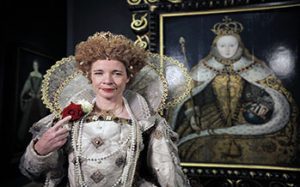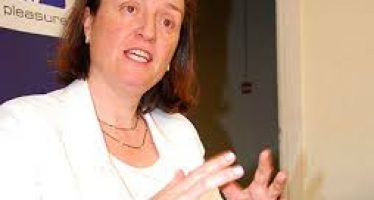Lucy Worsley: Bringing the Past to Life
 Books are the carriers of civilisation. Without them, history is silent, literature dumb, and science crippled. That certainty has changed, quite a bit, since US historian and author Barbara Tuchman (1912-1989) celebrated books as vessels of – and portals to – knowledge. Perhaps more fleeting in nature, and lacking depth, television has nibbled away at, if not supplanted, the book’s dominance in the dissemination of history.
Books are the carriers of civilisation. Without them, history is silent, literature dumb, and science crippled. That certainty has changed, quite a bit, since US historian and author Barbara Tuchman (1912-1989) celebrated books as vessels of – and portals to – knowledge. Perhaps more fleeting in nature, and lacking depth, television has nibbled away at, if not supplanted, the book’s dominance in the dissemination of history.
Sometime in the mid-1990s, large media conglomerates discovered a market for popular history – one they had largely ignored up to then. Seemingly overnight, multiple television channels popped up to explore past worlds. Not to be left behind, publishers churned out new magazines charting humanity’s progress throughout the ages.
Academia, instead of rejoicing in the interest for their arcane pursuits, mostly deplored the invasion of its ivory towers by the curious masses which tended to dispense with nuance and clamoured for the clarity offered by primary colours. Aghast at the demand for superficiality, the dons who diligently and jealously keep watch over academic propriety, accuse popular historians of dumbing down past events, steamrolling over dissenting viewpoints, and adorning the wheels of progress with unbecoming bells and whistles to create extravaganzas that never quite were.
Thus it was that Lucy Worsley (43), chief curator at Historic Royal Palaces and armed with impeccable Oxford credentials, got caught in the crossfire when she was invited to produce and present popular history programmes for the BBC. Considered by some to single-handedly sustain the BBC Four channel, Ms Worsley revels in dusting off history to unlock the past to millions of viewers. Quirky, puckish, and often downright funny, Lucy Worsley’s trademark style has brought history mainstream and boosted the usually rather dismal ratings of the highbrow channel.
Ms Worsley’s popularity is now such that her take on the six wives of Henry VIII debuted on the flagship BBC One network in December 2016. Fellow historian David Starkey is having none of it and wondered – out loud – why his female colleagues appearing on television are “usually quite pretty”. However, Mr Starkey, a constitutional historian and known for an acerbic tongue that earned him the sobriquet “rudest man in Britain”, may have been munching sour grapes. His own television series on the charismatic Tudor king and his multiple wives, broadcast in 2001, proved slightly less memorable.
A few historians lost it altogether with the notoriously subversive Terry Deary of Horrible Histories fame calling Ms Worsley spiteful, criticising her “posh little voice and play-acting”. The bête noir amongst British historians, Mr Deary, who penned over 200 history books for children and is one of the country’s best-selling authors, dismissed Ms Worsley’s day job as a waste of time:
“Royal palaces do not need curators; they are best left to rot away.”
Ms Worsley remains unfazed. She called Mr Starkey “an old owl” and wisely refused to engage with Mr Deary: “I admit to being an entry-level historian and don’t mean to have the last word on anything or put across an authoritative view that is not to be challenged. I try to show that history can, in fact, be fun. While doing so, I may step on a few toes.”
Away from the cameras, Mrs Worsley is much less flamboyant, admitting to a penchant for frugality and a minimalist lifestyle. According to friends, she is also quite reserved. The Guardian called her that rarest of beings: an introverted show-off. Ms Worsley, an accomplished author, last month stormed the best seller lists with Jane Austen at Home, a 400-page tome that sheds new light on the most famous of chroniclers of Victorian domestic life.
Much anticipated, the book promptly set off a storm in a teacup – now dubbed Pride and Plagiarism – over liberties taken with a 2013 biography of Jane Austen by Paula Byrne. The issue revolves mostly around Mrs Byrne’s discovery that the desk at which Jane Austen wrote most of her oeuvre afforded a sea view as depicted in an until recently ignored portrait of the author. This setting, it is argued in both books, linked Jane Austen’s Hampshire home to the world beyond.
Though hardly an issue to disturb most readers, it testifies to Ms Worsley’s enhanced status that her every word is weighed and measured against known fact and established academic convention. So far, no-one has inveighed against Ms Worsley’s credentials as a historian of note. With her television programmes and books she provides a welcome bridge between unassailable academia and the easily-digestible histrionics proffered by less scrupulous merchandisers of the past.
You may have an interest in also reading…
Paul Krugman: The Last of the Keynesians
He doesn’t hold out high hopes for the Trump presidency: in fact, calamity is on the horizon. Barely a month
Lady Rice: Wisdom as an Acquired Taste – A Voice of Reason
Lady Susan Rice is the first woman to head a UK clearing bank. Currently, she is managing director of Lloyds
Inez Murray: Women in Business – Bankers Advised to Take Note
Getting banks to notice women is quite the challenge. Whereas research consistently shows that women are exceedingly good at managing















































































